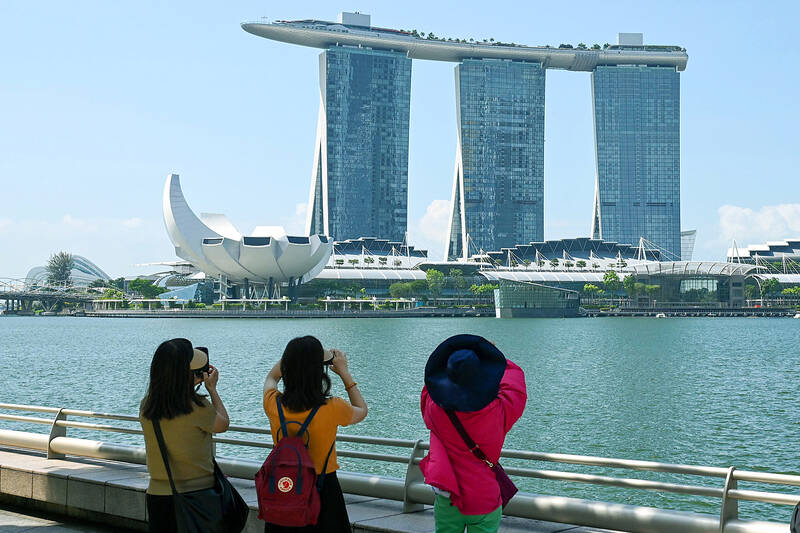The Singaporean economy posted better-than-expected results in the first quarter of this year, official data showed yesterday, but the government warned that the global outlook remains gloomy.
The Southeast Asian city-state’s economic performance is often seen as a barometer of the global environment because of its reliance on international trade.
Its economy expanded 0.4 percent year-on-year in first three months, slower than the 2.1 percent year-on-year growth in the previous quarter, but better than an advance estimate released last month, figures released by the Singaporean Ministry of Trade and Industry showed.

Photo: AFP
Quarter-on-quarter, the economy shrank 0.4 percent, but that was also better than expected.
The ministry maintained its growth forecast for this year of 0.5 to 2.5 percent, saying that the figure was likely to be in the middle of that range.
However, “downside risks in the global economy have risen,” it added.

Photo: AP
In its statement, it cited a “sharper-than-expected tightening in global financial conditions,” and “escalations in the war in Ukraine and geopolitical tensions among major global powers.”
There was a weak reading from the manufacturing sector, which shrank 5.6 percent year-on-year in the first quarter, worsening from the 2.6 percent shrinkage in the fourth quarter last year.
“Singapore’s external demand outlook for the rest of the year has weakened,” the ministry said.
“Apart from the expected slowdown in the advanced economies, the electronics downcycle is likely to be deeper and more prolonged than earlier projected,” it added.
Meanwhile, Germany fell into a recession around the turn of the year, official figures published yesterday showed, as inflation and higher interest rates curbed demand in Europe’s largest economy.
Over the first three months, the economy shrank 0.3 percent, the federal statistics agency Destatis said, downgrading an initial estimate of zero percent.
Following a 0.5 percent contraction in the final three months of last year, it was Germany’s second consecutive quarter of negative growth — the threshold for a “technical recession.”
The slump came as Germany battled a surge in energy prices in the wake of the Russian invasion of Ukraine, which has weighed on households and businesses.
The increased cost of energy has driven inflation, which sat at 7.2 percent in Germany last month, down only slightly from its peak toward the end of last year.
“The persistence of high price increases continued to be a burden on the German economy at the start of the year,” Destatis said in a statement.

CHIP RACE: Three years of overbroad export controls drove foreign competitors to pursue their own AI chips, and ‘cost US taxpayers billions of dollars,’ Nvidia said China has figured out the US strategy for allowing it to buy Nvidia Corp’s H200s and is rejecting the artificial intelligence (AI) chip in favor of domestically developed semiconductors, White House AI adviser David Sacks said, citing news reports. US President Donald Trump on Monday said that he would allow shipments of Nvidia’s H200 chips to China, part of an administration effort backed by Sacks to challenge Chinese tech champions such as Huawei Technologies Co (華為) by bringing US competition to their home market. On Friday, Sacks signaled that he was uncertain about whether that approach would work. “They’re rejecting our chips,” Sacks

Taiwan’s long-term economic competitiveness will hinge not only on national champions like Taiwan Semiconductor Manufacturing Co. (TSMC, 台積電) but also on the widespread adoption of artificial intelligence (AI) and other emerging technologies, a US-based scholar has said. At a lecture in Taipei on Tuesday, Jeffrey Ding, assistant professor of political science at the George Washington University and author of "Technology and the Rise of Great Powers," argued that historical experience shows that general-purpose technologies (GPTs) — such as electricity, computers and now AI — shape long-term economic advantages through their diffusion across the broader economy. "What really matters is not who pioneers

BUBBLE? Only a handful of companies are seeing rapid revenue growth and higher valuations, and it is not enough to call the AI trend a transformation, an analyst said Artificial intelligence (AI) is entering a more challenging phase next year as companies move beyond experimentation and begin demanding clear financial returns from a technology that has delivered big gains to only a small group of early adopters, PricewaterhouseCoopers (PwC) Taiwan said yesterday. Most organizations have been able to justify AI investments through cost recovery or modest efficiency gains, but few have achieved meaningful revenue growth or long-term competitive advantage, the consultancy said in its 2026 AI Business Predictions report. This growing performance gap is forcing executives to reconsider how AI is deployed across their organizations, it said. “Many companies

TAIWAN VALUE CHAIN: Foxtron is to fully own Luxgen following the transaction and it plans to launch a new electric model, the Foxtron Bria, in Taiwan next year Yulon Motor Co (裕隆汽車) yesterday said that its board of directors approved the disposal of its electric vehicle (EV) unit, Luxgen Motor Co (納智捷汽車), to Foxtron Vehicle Technologies Co (鴻華先進) for NT$787.6 million (US$24.98 million). Foxtron, a half-half joint venture between Yulon affiliate Hua-Chuang Automobile Information Technical Center Co (華創車電) and Hon Hai Precision Industry Co (鴻海精密), expects to wrap up the deal in the first quarter of next year. Foxtron would fully own Luxgen following the transaction, including five car distributing companies, outlets and all employees. The deal is subject to the approval of the Fair Trade Commission, Foxtron said. “Foxtron will be